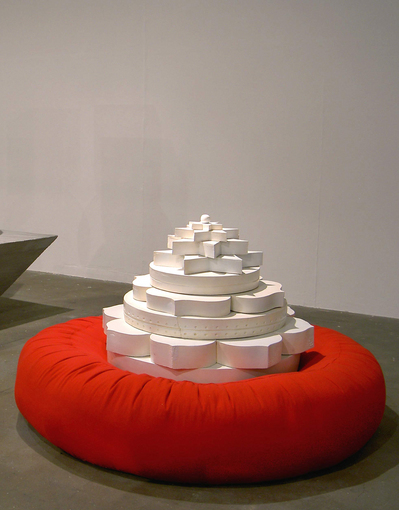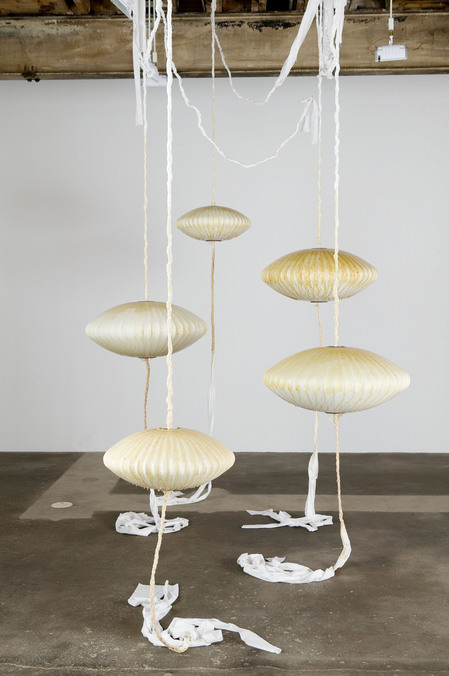Mai-Thu Perret's 'Ideal for Living' at UMMA explores the story of a world that never was

"They made no attempt to separate art from ritual" by Mai-Thu Perret
Mai-Thu Perret's “An Ideal for Living” installations at the University of Michigan Museum of Art encompass seemingly everything in the artist's oeuvre except the proverbial kitchen sink.
As the UMMA’s gallery guide tells us, this contemporary Swiss installation artist’s mid-career retrospective “fuses feminist politics with classic modernist abstraction and utopian dreams” by synthesizing “a range of media and genres — including literature, design, craft, and performance — conjuring an imaginary alternate history of 20th century art, design, and social activism.”
This is obviously a handful in more ways than one, given Perret’s formidable use of the museum’s spacious second-story A. Alfred Taubman Gallery. This exhibit space, easily the most expansive in Washtenaw County, is barely large enough to handle Perret’s many ambitious ideas.
As Jacob Proctor, UMMA associate curator of modern and contemporary art, says of the intricate display, “This exhibition presents an overview of Perret’s practice over the past decade. Much of this work has stemmed from “The Crystal Frontier,” a fictional narrative she began writing in 1999.“The ongoing, intentionally unresolved story follows a group of women who, in an attempt to escape the impositions of capitalism and patriarchal society, relocate to the remote New Mexico desert and form an autonomous community called New Ponderosa Year Zero.
“Presented in the form of diary entries, letters, manifestos, handbills, and the like, this fragmentary archive serves as a generative mechanism for installations and objects that Perret presents as the products of the commune’s residents.”
OK. This explains why Perret’s wide-ranging display looks like the joint effort of a number of differing talents. The facility is impressive — but the intent is even more ambitious.
For as Perret has herself said of her work, “This decontextualizing of historical fragments is a recurring interest of mine. I like the idea that you can make a thing mean something new, without completely erasing its original significance, so that you get an effect that is layered, almost ghostly.”
“Ghostly” isn’t the first word that comes to mind when scanning Perret’s work. Yet in running the gamut from posters and clothing to video, painting, and ceramics, “An Ideal for Living” is indeed like discovering the traces of a heretofore unknown civilization.
It’s unlikely that we’re going to see another exhibit anytime soon that so expertly intermingles varied realisms with varied abstractions and then purees the whole into sophisticated mixed-media installations.
The fictional remove of her New Ponderosa Year Zero allows Perret just enough distance to make the entirety a bit less self-reflexively driven. And this remove, in return, gives the retrospective enough objectivity to make the display ceaselessly intriguing.
Take for example, 2002’s sleek Bauhaus-inspired ceramic and wood table “Mescaline Tea Service” set near 2004’s “Postiviland (Isolation Bungalow Furniture)” and 2002’s ceramic set on cushion “They made no attempt to rescue art from ritual.”

"Positivland (Isolation Bungalow Furniture)" by Mai-Thu Perret
The polished turquoise tea service — four oversized ceramic cups and saucers with teapot, wood, and lacquer table — is a fine art treat that vaguely evokes association with Southwestern shamanic culture. But its association with “Postiviland (Isolation Bungalow Furniture)” is also unclear.
Unless, perhaps, the intent is to create by inference a sort of hallucinogenic haze by encountering “Postiviland (Isolation Bungalow Furniture)” hanging from the Taubman gallery ceiling. A pod of vinyl and aluminum lamps set at varying heights with latex tassels drooping on the floor, “Postiviland’s” cumulative effect is a biomorphic surreal ambiance crafted with an eye for functionality.
Which, interestingly, cannot be said of the 2002 ceramic and red fabric “They made no attempt to rescue art from ritual” mixed-media sculpture. This artwork has vague associations with the oversized pop sensibility of Claes Oldenburg, yet is crowned with nine inset ceramic geometric patterns that give the appearance of nonfunctional gears.
Perret’s playful mingling of hard-edge three-dimensional geometry with the lush, softer cushion forcefully smashes together the prime aesthetic ideologies of 1950s and 1960s in a single mixed-media object.
On the other hand, surely the most provocative dimension of “An Ideal for Living” is Perret’s 2007 silent “An Evening of the Book” 20 minute three-channel black and white video installation inspired by Soviet artist Varvara Stepanova’s 1924 agitprop play.
Borrowing Stepanova’s constructivist costumes and American musical choreography of the 1930s-40s with an intervening intermezzo taken from an unfinished 2003-04 play written by Perret with music by Steven Parrino—“Winter of Discontent (or the Ballad of a Russian Doll)”—the three-part video features a troupe of female performers choreographed in repetitive movements of work, rest and play.
Between these artworks — as well as a number of stunning oversized untitled inkblot paintings and a group of “Apocalypse Ballet” mannequins exercising — Perret’s retrospective is akin to mashing up 20th century art to create a single whole.
At the very least, this rousing “ideal for living” is a rallying cry for post-modernism to synthesize and overcome the conundrums of modernity. We should only be so lucky as to see where the second half of Perret’s career carries New Ponderosa Year Zero.
“Mai-Thu Perret: An Ideal for Living” will continue through March 13 at the University of Michigan Museum of Art, 525 S. State St. Museum hours are 10 a.m.-5 p.m. Tuesday-Saturday; and noon-5 p.m. Sunday. For information, call 734-763-UMMA.

